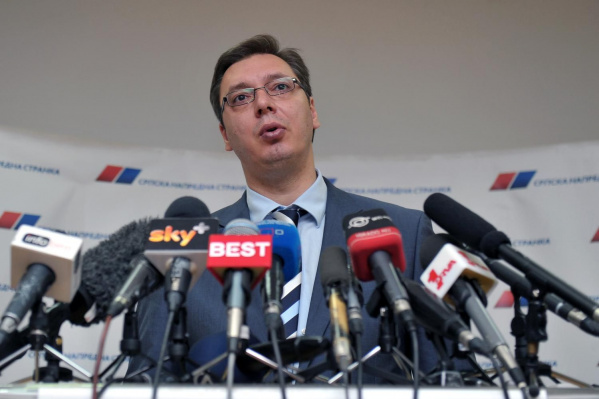
Monocle: Interview with Aleksandar Vucic
Aleksandar Vucic dresses to blend in. His grey suit, neat hair and glasses would fail to raise eyebrows in any boardroom or cabinet office. But in a reverse of the usual cliché, the leader of Serbia’s Progressive Party is a lot taller than he looks on TV – and packs an exceedingly firm handshake.
This is all very apt for a man who holds the title of first deputy prime minister – and yet is widely acknowledged as the most powerful figure in Serbian politics and an emerging leader in the Balkans. He has been the driving force in tackling three key issues that had long been holding back Serbia – Kosovo, the EU and corruption.
Within a year of his governing coalition taking office, it had completed deals with Kosovo on a normalisation of relations and with the EU on the start of membership negotiations. Meanwhile, Vucic personally took the helm of the anti-corruption campaign – as previously untouchable tycoons were arrested and charged for illegally profiting from privatisations.
All this has brought him enormous personal popularity – and power. There is constant speculation on when he will take over as prime minister, an office currently held by Ivica Dacic, the leader of the junior partner in the coalition. But Vucic appears to be content to bide his time. Perhaps this is because of his role in the notorious administration of Slobodan Milosevic. Vucic served as an oppressive minister of information – fining journalists who opposed the government and banning foreign TV networks.
His return to power – along with Dacic, a former Milosevic spokesman – caused some nervousness among western diplomats. But even the sceptics are starting to melt. “They are different than before,” says Natasa Kandic, founder of the Humanitarian Law Centre. “It’s important that they have changed and are calling for democracy.”
Monocle: You are the leader of the party that has the most seats, yet your title is first deputy. Why are you stepping back where others would push themselves forward?
Aleksandar Vucic: I just wanted to show that results and benefits for our people are something that I am interested in – not my titles. There are many people above myself regarding titles but people in Serbia don’t care about that. They care about results and I do my best to deliver.
M: There has been a normalisation of relations with Kosovo and an agreement with the EU about membership talks for Serbia. Is this everything you wanted to achieve?
AV: Of course I’m not satisfied. If you want to really accomplish something you need to put your targets on a higher level. Yes, we succeeded in opening accession talks with the EU and getting and implementing the Brussels Agreement with Kosovo – and we started a very important anticorruption fight. But I’m not satisfied with the economic situation and environment. Today,
if you need to get, let’s say, a building permit you’ll have to wait for decades. I hope we will be able to change that to less than a month.
M: Historically your government has had better relations with Russia than with the EU. Why have you chosen to go down the path of EU membership?
AV: It is not so popular in Serbia as you might think. But it is very much related to the modernisation of this country. We will have to change our mindsets, our habits, ourselves – and that is the most important thing. If we don’t change ourselves, if we don’t do something regarding the rule of law or many other changes in different social spheres, we won’t be successful in the future.
M: In the 1990s you were minister of information in the Milosevic government.
AV: After 1999 we saw the result of our politics – it was very bad in all social spheres. We had as many ruined bridges and buildings as you can imagine. We cannot say it was all the fault of Serbia – but that was the result of our politics. We needed to change our aims and our unsuccessful and harmful politics. We all made some terrible mistakes and I’m not ashamed to confess that. We need to find a better way for Serbia and now we have to be very firm, focused, concentrated – even devoted – if we want to find a better way for our people.
Source: Monocle / Author: Guy De Launey

